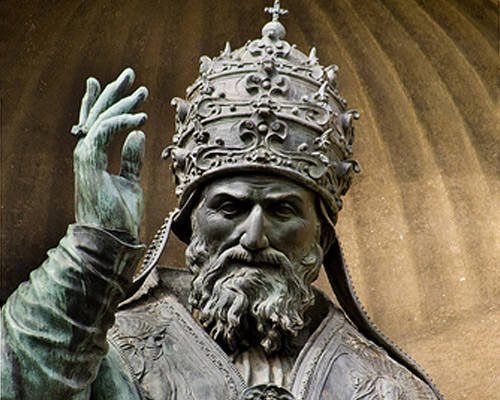
By Rabbi Ari Enkin, rabbinic director, United with Israel
The emperor Caesar celebrated the first New Year’s Day by ordering a major attack on Jews. For centuries, others in Europe and elsewhere followed suit, torturing and murdering Jews.
The ancient Romans originally dedicated New Year’s Day to Janus, the god of gates, doors and beginnings for whom the first month of the year, January, is named. Janus had two faces, one looking forward and one looking backward. This is the source for the custom to make an accounting of the past year and to make resolutions for the coming one.
Among the seventh century pagans of the Netherlands and its colonies, it was the custom to exchange gifts on the New Year. Saint Eligius (died circa 660) tried to put an end to this custom and other merriment that was common on New Year’s Eve and which he deemed inappropriate, but to no avail.
As Christianity spread, pagan holidays were either incorporated into the Christian calendar or abandoned altogether. By the early medieval period, most of Christian Europe regarded Annunciation Day (March 25) as the beginning of the year. After William the Conqueror (aka “William of Normandy”) became King of England on December 25, 1066, he decreed that the English return to the date established by the Roman pagans, January 1. This move ensured that the commemoration of Jesus’ birthday (December 25) would align with William’s coronation, and the commemoration of Jesus’ circumcision (January 1) would start the New Year, thereby rooting the English and Christian calendars and his own Coronation. William’s innovation was eventually rejected, and England rejoined the rest of the Christian world and returned to celebrating New Year’s Day on March 25.
Anti-Semitic Origins
In 46 or 45 BCE, Roman emperor Julius Caesar established January 1 as New Year’s Day. Unfortunately, Caesar celebrated the first New Year’s Day by ordering a major attack on Jewish forces in the Galilee. Eyewitness accounts say that blood flowed in the streets. Sometime later, Roman pagans began marking December 31 with drunken and immoral gatherings. They believed that this was a reenactment of the chaotic void that existed before the gods brought order to the cosmos.
On New Year’s Day 1577 Pope Gregory XIII decreed that all Roman Jews, under pain of death, must listen attentively to a compulsory Catholic conversion sermon that was to be given in Roman synagogues after Friday night services. On New Year’s Day 1578 Gregory signed into law a tax forcing Jews to pay for the support of a “House of Conversion” to convert Jews to Christianity.
On New Year’s 1581, Gregory ordered his troops to confiscate all sacred literature from the Roman Jewish community. Thousands of Jews were murdered in the campaign. Throughout the medieval and post-medieval periods, January 1 was reserved for anti-Jewish activities: synagogue and book burnings, public tortures and simple murder.
Israel is ironically among the few countries that call New Year’s Day after known Jew-hater Pope Sylvester, who died on December 31. Many European countries adopted this name to mark the day of the Feast of the Pope, instead of New Year’s Eve. The name reached Israel probably due to Ashkenazi influence, which is rather ironic since Sylvester is also known to have been viciously anti-Semitic.
Pope Sylvester had convinced Roman emperor Constantine to prohibit Jews from living in Jerusalem. At the Council of Nicaea, too, Sylvester promulgated a host of new anti-Semitic legislation. Not surprisingly, Sylvester became a saint in the Church for this and other “achievements,” and his “Saint’s Day” is (you guessed it) December 31. In medieval Europe, the night of December 31 was often reserved for synagogue and Hebrew book burnings, tortures and other anti-Jewish sport.
This is the second of three in a series on the concept of a New Year. For the first article, click HERE.
